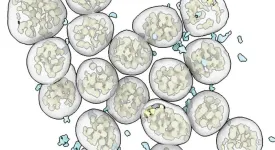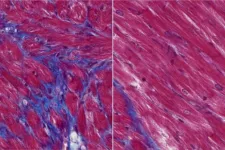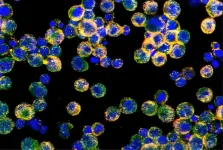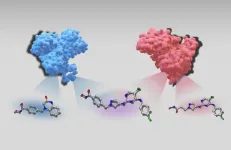(Press-News.org) The National Institutes of Health (NIH) has launched a proof-of-concept precision medicine clinical trial to test new treatment combinations targeting specific genetic changes in the cancer cells of people with acute myeloid leukemia (AML) and myelodysplastic syndromes (MDS). The trial, funded by NIH’s National Cancer Institute (NCI), aims to accelerate the discovery of more tailored treatments for these aggressive cancers of the blood and bone marrow.
“AML and MDS are a heterogeneous group of cancers that can progress very quickly. Treatment advances depend in part on the ability to rapidly identify which subtype of cancer each patient has so that treatments can be tested for their specific cancer,” said Richard F. Little, M.D., of NCI’s Division of Cancer Treatment and Diagnosis. Dr. Little is the NCI coordinator for the trial, known as the Myeloid Malignancies Molecular Analysis for Therapy Choice (myeloMATCH). “The goal of myeloMATCH is to test combinations of drugs to treat the disease in a highly targeted way and to be able to start treatment quickly after diagnosis.”
Initially, people enrolled in the trial with newly diagnosed AML or MDS will undergo rapid genetic testing of their tumor samples. Based on the molecular characteristics of their tumors, they will be matched to a substudy testing a treatment appropriate for the specific genetic changes and characteristics associated with their disease, if one is available, or to standard treatment if an appropriate substudy is not available.
If the initial treatment works to reduce a patient’s disease, they will undergo further genetic testing to match them to a subsequent substudy testing a treatment that is appropriate for the specific genetic changes associated with their remaining disease. As the amount of a patient’s disease decreases, study investigators will use increasingly sensitive tools, such as biomarker assays, to identify appropriate treatments for any remaining cancer cells.
The myeloMATCH trial aims to enroll several thousand people within the first few years, with new substudies rolled out over time. Blood and bone marrow samples collected from participants during the course of the trial will be used to develop and refine the assays, as well as understand what genetic changes might be associated with the development of resistance to a treatment.
myeloMATCH is being conducted by the National Clinical Trials Network, with the participation of the NCI Community Oncology Research Program (NCORP). Initial substudies will be led by the SWOG Cancer Research Network, the Alliance for Clinical Trials in Oncology, the ECOG-ACRIN Cancer Research Group, and the Canadian Cancer Trials Group. The Frederick National Laboratory for Cancer Research, Fred Hutch Cancer Center, and Children’s Hospital Los Angeles will provide clinical laboratory support for the substudies.
myeloMATCH is one of three next-generation precision medicine trials that NCI has under way. ComboMATCH is testing the effectiveness of treating adults and children who have relapsed solid tumors with new drug combinations that target specific tumor alterations. ImmunoMATCH has launched a pilot study to determine whether prospective characterization of the immune status of a tumor can be used to improve the response to targeted immunotherapy treatments, with plans to expand to larger studies in the future.
All three trials are successors to NCI-MATCH, NCI’s groundbreaking precision medicine clinical trial, which showed that people with advanced cancer may benefit from genomic sequencing to help plan their treatment.
Learn more about myeloMATCH and the substudies that are currently open.
VIRTUAL MEDIA BRIEFING
WHAT: Learn more about the myeloMATCH initiative, gain insights from some of the study leaders, and hear from a patient advocate. The information from the media briefing is embargoed until Wednesday, October, 23, 2024, at 11:00 a.m. ET. By registering and attending, you are agreeing to honor the embargo.
WHO:
Richard F. Little, M.D., NCI coordinator for myeloMATCH
Jerald Radich, M.D., myeloMATCH Laboratory Assays & Informatics Group co-chair
Gail Sperling, M.P.H., myeloMATCH patient advocate
WHEN: Tuesday, October 22, 2024, at 11:30 a.m. ET
WHERE: Register by emailing ncipressofficers@nih.gov
###
About the National Cancer Institute (NCI): NCI leads the National Cancer Program and NIH’s efforts to dramatically reduce the prevalence of cancer and improve the lives of cancer patients and their families, through research into prevention and cancer biology, the development of new interventions, and the training and mentoring of new researchers. For more information about cancer, please visit the NCI website at www.cancer.gov or call NCI’s contact center, the Cancer Information Service, at 1-800-4-CANCER (1-800-422-6237).
About the National Institutes of Health (NIH): NIH, the nation's medical research agency, includes 27 Institutes and Centers and is a component of the U.S. Department of Health and Human Services. NIH is the primary federal agency conducting and supporting basic, clinical, and translational medical research, and is investigating the causes, treatments, and cures for both common and rare diseases. For more information about NIH and its programs, visit nih.gov.
END
New York, NY, October 23, 2024 — Scientists at the Icahn School of Medicine at Mount Sinai, in collaboration with colleagues in the field, have developed an innovative antibody platform aimed at tackling one of the greatest challenges in treating rapidly evolving viruses like SARS-CoV-2: their ability to mutate and evade existing vaccines and therapies.
Their findings, including preclinical studies in mice, introduce the Adaptive Multi-Epitope Targeting and Avidity-Enhanced (AMETA) Nanobody Platform, a new antibody approach for addressing how viruses like SARS-CoV-2, which causes COVID-19, evolve to evade vaccines and treatments. Details on the results were published October 23 ...
Four leading cancer research organizations in the United States and Canada announce the opening of patient enrollment to myeloMATCH, a unique portfolio of clinical trials to test precision medicine treatments for adults with acute myeloid leukemia (AML) or myelodysplastic syndrome (MDS).
The Alliance for Clinical Trials in Oncology, Canadian Cancer Trials Group, ECOG-ACRIN Cancer Research Group, and SWOG Cancer Research Network are collaborating within the National Cancer Institute (NCI) National Clinical Trials Network (NCTN) to design and lead the trials. They expect to open ...
About The Study: In this cross-sectional study of 14,000 insured adults, individual-level social determinants of health were significantly associated with U.S. health care expenditures by Medicare, Medicaid, and private insurers. These findings may inform health insurers and policymakers to incorporate social determinants of health in their decision-making practices to identify and control health care expenditures, advancing health equity.
Corresponding Author: To contact the corresponding author, Giridhar Mohan, MPH, email gmohan1@jhu.edu.
To access the embargoed study: Visit our For The Media website at this link https://media.jamanetwork.com/
(doi:10.1001/jamanetworkopen.2024.40467)
Editor’s ...
About The Study: In this cohort study, distinct forms of traumatic and adverse childhood experiences differentially moderated developmental changes in psychiatric risk and cognitive ability in different ways, offering the possibility for precision-based prediction of risk for youth. Such findings could be used in targeted early prevention and intervention strategies for at-risk youth.
Corresponding Author: To contact the corresponding author, Justin D. Russell, PhD, email jdrussell3@wisc.edu
To access the embargoed study: Visit our For The Media website at this link https://media.jamanetwork.com/
(10.1001/jamapsychiatry.2024.3231)
Editor’s ...
A new study from Washington University School of Medicine in St. Louis suggests that a type of immunotherapy — similar to that approved by the Food and Drug Administration (FDA) to treat inflammatory conditions such as arthritis — also may be an effective treatment strategy for heart failure.
The study is published Oct. 23 in the journal Nature.
After a heart attack, viral infection or other injury to the heart, scar tissue often forms in the heart muscle, where it interferes with the heart’s normal contractions and plays a leading role in heart failure, the progressive loss of the heart’s ...
Weill Cornell Medicine researchers have discovered a mechanism that ovarian tumors use to cripple immune cells and impede their attack—blocking the energy supply T cells depend on. The work, published Oct. 23 in Nature, points toward a promising new immunotherapy approach for ovarian cancer, which is notoriously aggressive and hard to treat.
A significant obstacle in treating ovarian cancer is the tumor microenvironment—the complex ecosystem of cells, molecules and blood vessels that shields cancer cells from the immune system. Within this hostile environment, T cells lose their ability to take up the lipid (fat) molecules, which are necessary for energy to mount ...
Many black holes detected to date appear to be part of a pair. These binary systems comprise a black hole and a secondary object — such as a star, a much denser neutron star, or another black hole — that spiral around each other, drawn together by the black hole’s gravity to form a tight orbital pair.
Now a surprising discovery is expanding the picture of black holes, the objects they can host, and the way they form.
In a study appearing in Nature, physicists at MIT and Caltech report that they have observed a “black hole triple” for the first time. The new system holds a central black hole in the act of consuming a small star ...
Researchers from the University of Bonn have trained an AI process to predict potential active ingredients with special properties. Therefore, they derived a chemical language model – a kind of ChatGPT for molecules. Following a training phase, the AI was able to exactly reproduce the chemical structures of compounds with known dual-target activity that may be particularly effective medications. The study has now been published in Cell Reports Physical Science. Do not publish before Wednesday, October 23rd, 5:00 pm CEST!
Anyone ...
PHOENIX, AZ (Oct. 23, 2024) — Soteria Precision Medicine Foundation, a non-profit organization dedicated to providing leading-edge patient precision medicine navigation services to individuals with cancer diagnoses, today announced a partnership with the Translational Genomics Research Institute (TGen), part of City of Hope, to provide precision medicine navigation for Special Operation Forces in their battle against cancer.
Through the strategic agreement with TGen, Soteria will deploy, and scale precision medicine navigation capabilities tailored to meet the unique needs of Special Operation Forces (SOF) members ...
Capturing and storing the carbon dioxide humans produce is key to lowering atmospheric greenhouse gases and slowing global warming, but today's carbon capture technologies work well only for concentrated sources of carbon, such as power plant exhaust. The same methods cannot efficiently capture carbon dioxide from ambient air, where concentrations are hundreds of times lower than in flue gases.
Yet direct air capture, or DAC, is being counted on to reverse the rise of CO2 levels, which have reached 426 parts per million (ppm), 50% higher than ...





